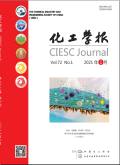化工学报2024,Vol.75Issue(5):2047-2059,13.DOI:10.11949/0438-1157.20231153
光热-跨临界压缩二氧化碳储能循环动态特性研究
Research of dynamic characteristics of photothermal coupled transcritical compressed carbon dioxide energy storage cycle
摘要
Abstract
In order to improve the impact of fluctuations in new energy generation on the power grid,this paper proposes an integrated thermal system called the photothermal coupled transcritical compressed carbon dioxide energy storage(TC-CCES)cycle.The dynamic mathematical models of TC-CCES system and photothermal system were established based on the energy and mass balance relationship,and the dynamic response curves of key parameters of TC-CCES system in energy storage and release stage were obtained.The research results show that the energy storage density of the system reaches 28.43 kW/m3,the energy storage efficiency and cycle efficiency are 58.01%and 60.85%respectively,and the maximum error of the dynamic mathematical model is less than 5%.In addition,changes in direct solar radiation cause the system heat source temperature to change,and the system load is very sensitive to changes in heat source temperature.The heat source temperature increases by 2.29%,and the heat exchanger load increases by 3.36%.In a typical day of four seasons in a certain area,the unit load in winter is 23.9%lower than that in autumn.The dynamic mathematical model presented in this paper can be used to analyze the dynamic characteristics of solar power generation,and lays a theoretical foundation for the design of the control system.关键词
光热/T-CO2储能循环/模型/动态特性/建模仿真Key words
photothermal/T-CO2 energy storage cycle/model/dynamic characteristic/modeling and simulation分类
能源科技引用本文复制引用
王迪,陈伟倩,孙灵芳,周云龙..光热-跨临界压缩二氧化碳储能循环动态特性研究[J].化工学报,2024,75(5):2047-2059,13.基金项目
国家自然科学基金项目(52306004) (52306004)

